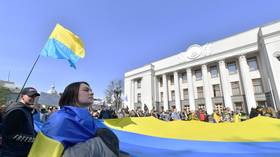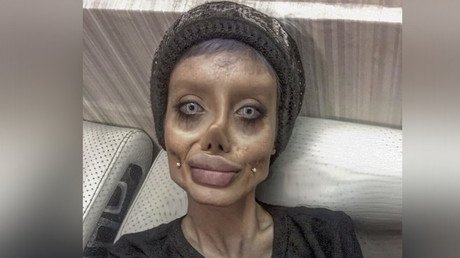Ukraine passes controversial language law, isolating Russian-speakers

Ukraine’s parliament has passed a law requiring the use of the Ukrainian language in almost all aspects of public life. While the move aims to solidify national identity, it could disenfranchise the country’s Russian speakers.
The law, which passed by 278 votes to 38 on Thursday, obliges all Ukrainian citizens to know the national language, and requires that it be used for all official duties. Doctors, politicians, judges, teachers, and soldiers are all among the groups that will have to speak Ukrainian in the workplace.
Parliament passes law on #Ukrainian language#Kiev#Ukrainepic.twitter.com/GHrVF5t5Nx
— Ruptly (@Ruptly) April 25, 2019
Under the new law, 90 percent of TV and film content produced in Ukraine must be in the national language, while 50 percent of books and other written media must also be in Ukrainian.
Outgoing President Petro Poroshenko was a champion of the law, describing it as “one more important step on the path to our independence.” Poroshenko is expected to sign off on the law before his successor, comedian Volodymyr Zelensky takes office. The president-elect has been speaking mostly Russian during his performances but promised to brush up his Ukrainian skills. Although the recent election brought a change of leader, the makeup of the Rada (Ukrainian parliament) remains unchanged.
Also on rt.com Landslide victory: Early Ukraine election results show Zelensky’s near 50-point lead over PoroshenkoWhile the law was greeted with cheers and flag-waving in parliament, Ukraine’s Russian-speaking minority is not happy. Russian is the native language of around 30 percent of Ukrainians, most of whom live in the country’s east. These Russian-speakers have been hit by several anti-Russian laws since the Euromaidan demonstrations broke out in 2013.
In February 2017, Poroshenko’s government banned the commercial importation of books from Russia, which had until then accounted for up to 60 percent of books sold in Ukraine. Two separate bills later that year enforced the use of the Ukrainian language in education and television.
Russians have not been the only victims of the Poroshenko government’s forced Ukrainization. The country also has Romanian, Polish, and Hungarian-speaking minorities, who were affected by a law last year banning the teaching of these languages beyond the primary school level.
Also on rt.com ‘Semi-fascist’ attack on minorities: Hungarian official slams Ukraine’s education reformNor is Moscow the only foreign observer angered by the law. The Office of the United Nations High Commissioner for Human Rights wrote last year that the then-draft legislation raised “serious concerns” with regard to "international human rights standards.”
With anti-Russian sentiment bubbling in Kiev, Russian President Vladimir Putin offered a lifeline to Russian-speaking residents of eastern Ukraine on Wednesday, passing a decree to simplify the process of getting a Russian passport. The breakaway republics of Lugansk and Donetsk are home to an estimated 3.7 million residents, predominantly Russian speakers.
Ukrainian authorities have imposed a strict blockade on these regions, preventing cash and goods flowing into the area. As such, residents are frequently forced to go east into Russia to purchase basic household goods and medical treatment.
“People living on the territories of the Donetsk and Lugansk republics are completely deprived from any civil rights, it crosses all boundaries from a human rights perspective to tolerate this situation,” Putin said.
Think your friends would be interested? Share this story!














